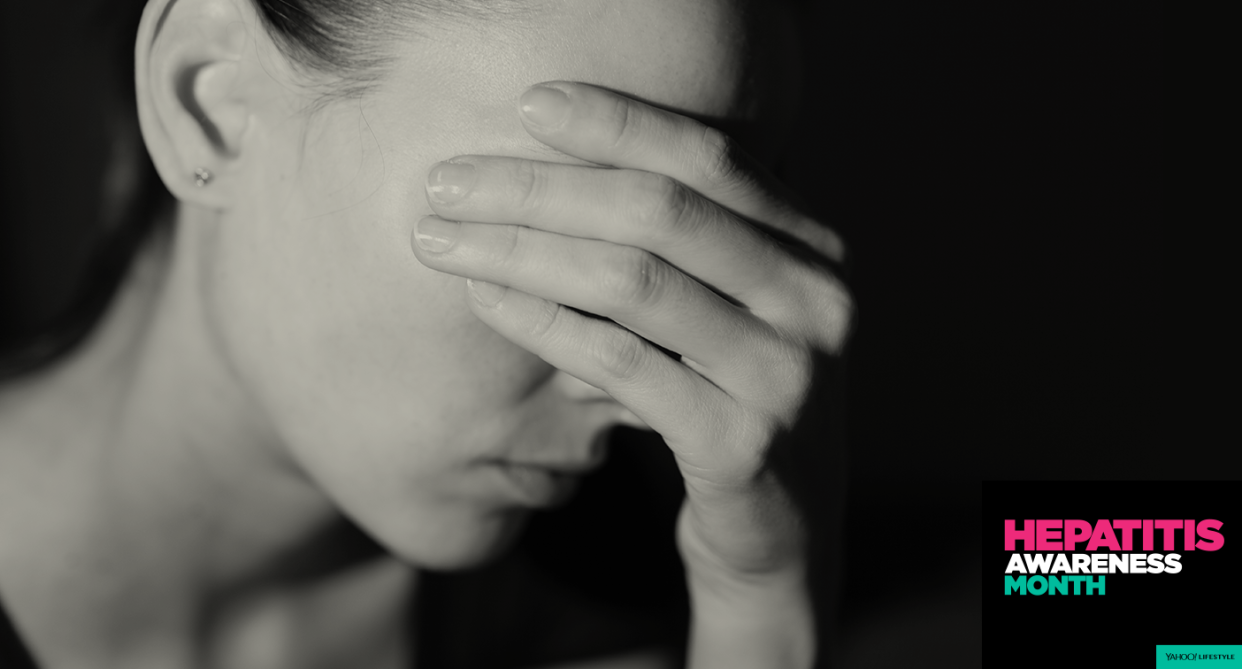When you think having a disease is 'punishment' for past behavior

While some diseases, such as cancer, illicit instant sympathy and caring, others, like hepatitis C, HIV/AIDS, and mental illness are often shrouded in shame, fear, and misunderstanding.
In fact, according to a survey by the World Hepatitis Alliance (WHA), more than 90 percent of countries report some degree of stigma and discrimination against those with viral hepatitis (primarily hepatitis C and B), which affects 325 million people globally. And, according to the report, having a disease that’s viewed as something to be ashamed of has far-reaching effects on a person’s life.
“In 2017, we surveyed civil society organizations from 72 countries to better understand experiences of stigma and discrimination across the world,” Michael Ninburg, president of World Hepatitis Alliance, tells Yahoo Lifestyle. “The findings show that stigma not only affects an individual’s ability to access diagnostics and treatment but also impacts their personal life, mental health and ability to work, learn, and maintain relationships.”
Part of the reason why there’s shame associated with hepatitis C in particular is that, in many countries, the disease is closely linked with injection drug use, which carries its own stigma. “Injection drug use is one of the risk factors for hepatitis C, and the stigma with drug use in our society unfortunately gets transferred to patients with hepatitis C,” Andrew Muir, MD, a member of the American Liver Foundation’s national medical advisory committee, tells Yahoo Lifestyle.
However, sharing needles is only one of several ways that hepatitis C is transmitted. The WHA report points out that “the large majority of hepatitis C transmission is through unsafe healthcare practices, including the use of unsterilized equipment and poorly-screened blood transfusions, and hepatitis B is most often passed from mother to child during birth.”

But one of the more surprising findings of the report was the high level of “self-stigmatization” reported by people with hepatitis C. It’s what Ninburg describes as “feelings of blame, worthlessness, internalized shame or a sense that viral hepatitis in a punishment for certain behaviors.”
He adds: “It is truly heart-breaking to learn that 72 percent of people living with the virus experience these feelings,” he says. Self-stigmatization has both emotional and long-term physical consequences, notes Ninburg, and can prevent people from seeking help and accessing medical care.
“When people start to wrongly view someone as ‘dirty’ or ‘contagious,’” says Ninburg, “it can result in social exclusion and abuse, as well as having a deeper impact on an individual’s opportunities for employment, education, healthcare, and family. “
Ninburg continues: “Many people living with viral hepatitis also experience self-stigma. When society views the illness in such a way, it is no surprise that people internalize the stigma. This can obviously have a significant and lasting impact on individual’s wellbeing.”
Maggie McGehee, who found out she contracted hepatitis C from life-saving blood transfusions as an infant and is now cured, knows firsthand what it’s like to feel a sense of shame surrounding a disease. Although her family and workplace were supportive of her, she struggled with self-acceptance. “I absolutely isolated myself and withdrew from friends and activities I loved,” the Seattle resident shares with Yahoo Lifestyle. “I got deeply depressed and felt extremely ‘other’ and ashamed. I felt unclean and like I didn’t belong with good people anymore.”
Lindsay Ventura, who contracted hepatitis C from her mother during childbirth and is now cured, kept the disease a secret for years out of fear of being stigmatized for it.
“Liver disease in general comes with a stigma,” Ventura tells Yahoo Lifestyle. “People feel they need to justify themselves. They’re so quick to say, ‘I have cirrhosis but not from drinking.’ It doesn’t matter. That shouldn’t be the conversation.”

She adds: “Liver disease is lonely. I’m thankful I had my mom and sister to talk to, but beyond that, I was really lonely and felt extreme fear that anyone would find out. In part because of the social stigma I had met but also something I’d put on myself, that there was a disease inside of me that put others at risk.”
Ninburg says the organization was “appalled” by the report’s findings of how pervasive stigmatization is. In response, the organization launched a campaign on March 1, 2018 — coinciding with Zero Discrimination Day — called #StigmaStops. The aim of the campaign is to “highlight the true impact of stigma, encourage the hepatitis community to challenge misconceptions and empower people living with viral hepatitis to share their experiences.”
Part of the campaign includes people with hepatitis from all over the world — from Greece and China to Uganda and the U.S. — opening up about their personal experiences with their diseases on WHA’s Wall of Stories.
Muir says that connecting with others who have the same health condition can help patients feel less isolated and alone. “I think many patients are already helping by offering online forums and other opportunities to support other patients,” he says. “Patients may feel more comfortable sharing their diagnosis with family and friends if they hear the experiences of others.”
Adds Ninburg: “No one should have to suffer from stigma and discrimination due to an illness.”
May is Hepatitis Awareness Month. Read more about the disease on Yahoo Lifestyle:
The blood transfusion that saves my life gave me hepatitis C
Why baby boomers and veterans are more likely to have hepatitis C
Do you ever share toothbrushes? You could be exposing yourself to a disease
Follow us on Instagram, Facebook, and Twitter for nonstop inspiration delivered fresh to your feed, every day.



